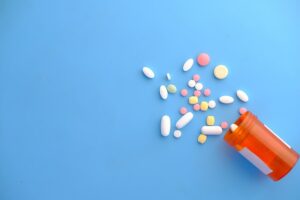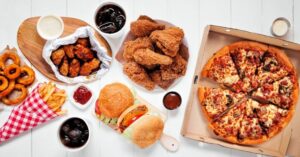Google “10,000 calorie problem” or seek for #cheatday on any social media community, and also you’ll discover limitless examples of match folks consuming ungodly quantities of meals with out getting fats.
You most likely know somebody who’s capable of put away platters of meals with out placing on weight.
What provides?
Are they blessed with ”skinny” genes?
Have they got a “quick” metabolism?
No and no.
Whereas it might appear to be some persons are merely proof against gaining weight it doesn’t matter what or how a lot they eat, their our bodies observe the identical guidelines as yours.
The unsexy clarification for his or her seeming freedom from fats achieve boils all the way down to their consuming and train habits (together with those you don’t see), not some inborn trait that permits them to gorge with impunity.
In actuality, there are three explanations for why some folks can (seemingly) eat no matter they need with out gaining weight:
- You most likely aren’t observing these folks always or rigorously measuring their calorie consumption, and it’s possible their common meals consumption is lower than you assume.
- You additionally most likely aren’t observing these folks’s train habits, and it’s possible they’re exercising greater than you understand.
- Whereas overeating for a couple of days (or weeks) will nearly all the time trigger some fats achieve, a number of modifications happen in your physique that stop all the energy you eat from being saved as physique fats.
The primary two factors are easy.
Folks witness somebody frequently consuming giant quantities of meals with out gaining fats, they usually assume this is because of some organic blessing like a “quick metabolism.”
{Dollars} to doughnuts, although, they’re basing this evaluation on a couple of snapshots of the individual’s day by day routine. Perhaps it’s a coworker or classmate who eats giant lunches, or a pal who gluts themselves at vacation events, or a roommate who appears to snack nonstop all through the day.
In actuality, most of those folks don’t eat as a lot as you may assume at first blush, as a result of they eat much less the remainder of the time.
For example, that pal who appears to go hog wild at lunch could not eat breakfast or solely has a light-weight dinner. That roommate who all the time has a snack of their hand? Perhaps they not often eat giant meals. The one that binges at events? In all probability eats smaller parts the remainder of the time.
The scientific time period for this hole in your data is called a choice bias, and it impacts all of us. You see skinny Dave devouring a complete pizza on the New 12 months’s Eve get together (wow, he eats a lot), however miss out on that he eats considerably much less the remainder of the week. You discover lean Lisa munching on fruit and nuts all day, however don’t understand she not often eats giant meals.
This identical precept applies to exercise ranges. Whereas some folks do eat significantly greater than others with out gaining weight, they’re additionally far more energetic.
Somebody who lifts weights two or thrice per week and walks their canine a couple of laps across the block doesn’t must eat almost as a lot as somebody who hits the gymnasium 5 days per week, participates in a sport like Brazilian Jiu Jitsu, and goes rucking, mountaineering, and biking on the weekends.
In different phrases, most individuals who appear to eat so much with out gaining fats don’t have an innately “quick metabolism.” As an alternative, they most likely eat about as many energy as they burn over time, and also you’re overestimating their calorie consumption or underestimating their exercise ranges.
All of that mentioned, there are a couple of quirks of human physiology that stop all the energy we eat from being saved as physique fats, and this partially explains why the aftermath of overeating isn’t as extreme as we typically assume.
To wit, listed below are the principle elements at play:
- You burn extra energy digesting meals.
- You retailer some macronutrients as fats extra simply than others.
- You (could) transfer extra while you eat extra.
- You don’t take up each calorie you eat.
Let’s have a look at every in flip.
You burn extra energy digesting meals.
While you eat a meal, your physique has to expend power to digest and course of the meals. This is called the thermic impact of meals (TEF).
Research reveals it accounts for about 10% of your whole day by day power expenditure. That’s, about one in ten energy you eat is burned digesting your meals.
How a lot power you burn via TEF depends on the scale and composition of the meal.
Smaller meals require much less power to digest, so that they trigger a smaller improve in power expenditure.
Giant meals, alternatively, require way more power to digest, so that they trigger a a lot better rise in power expenditure. (That is additionally a part of why you’re feeling hotter after consuming a big meal—your physique is expending power to show that meals into usable energy).
Some macronutrients additionally raise TEF greater than others:
- Protein has the very best TEF of round 20-to-30%.
- Carbohydrate has a TEF of 5-to-10%.
- Fats has a TEF of 0-to-3%.
What this implies is that meals greater in protein and carbohydrate trigger a better improve in TEF than meals excessive in fats.
How processed or unprocessed your meals can also be modifications its impact on TEF. In a single study carried out by scientists at Pomona School, they discovered a processed-food meal of white bread and American cheese elevated TEF about 10%, whereas a whole-food meal of multi-grain bread and cheddar cheese elevated TEF about 20%.
One other study discovered related outcomes when folks burned 92 further energy per day by consuming entire grains as an alternative of refined grains for six weeks.
Thus, let’s say you overeat 1,000 energy. Proper off the bat, you’re shedding about 100 of these energy to the thermic impact of meals. If the meal is excessive in protein or carbs and largely composed of entire meals, you may burn nearer to 150 or 200 energy.
You retailer some macronutrients as fats extra simply than others.
What number of energy you retailer as fats additionally is determined by what share of these energy come from protein, carbohydrate, or fats.
It’s because not all macronutrients are processed the identical means by the physique.
Protein is used nearly fully for repairing, constructing, and regenerating cells, hormones, and different molecules within the physique, and the surplus is burned off as gasoline within the liver. It’s by no means straight transformed into physique fats.
Carbohydrate is mostly stored within the muscle tissue and liver within the type of glycogen. Regardless of what many individuals consider, carbs are not often transformed straight into physique fats.
Fats is chemically similar to physique fats, and thus your physique prefers to retailer dietary fats as physique fats and burn carbs and protein for fast power as an alternative.
Now, you is perhaps considering you possibly can outsmart your physique’s metabolism by overeating carbs and protein and maintaining your fats consumption low, however this isn’t as efficient as you may assume. Consuming too many carbs could make you achieve fats, simply not in the identical means as overeating fats.
Chemically talking, carbs are very completely different from the molecules that make up physique fats (triglycerides), they usually should endure an energy-intensive course of often known as de novo lipogenesis (DNL) to be transformed into physique fats.
The factor is, DNL solely ramps up sufficient to make a distinction in your physique fats ranges after a number of days of gorging your self on carbs. We’re speaking 700-to-1,000+ grams per day for most individuals.
Even then, about 15-to-25% of the power in carbohydrate is lost throughout the means of changing it into fats, so 100 energy’ value of carbs may solely flip into 75 or 85 energy’ value of physique fats.
Overeating carbs can improve fats storage in one other means, although. As your physique burns an increasing number of carbs for power, it burns proportionally much less of the fats you eat, and thus extra dietary fats is saved as physique fats.
What this implies is that the extra carbs you eat, the extra fats you’ll retailer and the much less you burn all through the day.
That is why most studies show that individuals achieve related quantities of physique fats after overeating carbs or fats.
In different phrases . . .
- Consuming extra dietary fats ends in the direct storage of physique fats.
- Consuming extra dietary carbs ends in a number of the carbs being transformed to fats (for those who eat a ton of carbs for a number of days), and it ends in any fats you eat being primarily saved as physique fats.
And in case you’re questioning, alcohol is burned instantly as a result of the physique has no technique to retailer it, and is thus by no means saved as physique fats. It does, nonetheless, shut down fats burning in the same method to carbs, which signifies that whereas alcohol is in your system, you’re going to retailer nearly all the fats you eat as physique fats. (This isn’t to say that alcohol is inherently unhealthy, although, as defined in this text.)
Now, for those who’re prepared to maintain your fats consumption very low, you possibly can reduce fats achieve by primarily overeating on carbs and protein. Extra on how this works in a second.
You (could) transfer extra while you eat extra.
There’s some fact to the concept that some folks have naturally “quick metabolisms,” and might eat greater than others with out gaining as a lot weight.
This isn’t as a result of some persons are blessed with fats burning genes, although. As an alternative, the explanation some folks appear to have quick metabolisms is because of how their exercise ranges change once they overeat.
Research shows some folks will spontaneously and subconsciously transfer extra all through the day once they overeat, and this improve in exercise may also help them burn as much as 700 further energy per day.
That’s, if persons are fed 1,000 energy extra per day than they should keep their weight, some will burn off about three-quarters of that simply by fidgeting, tapping their legs, and transferring round extra all through the day.
These actions are often known as non-exercise exercise thermogenesis (NEAT). One factor you must learn about NEAT, although, is that it varies a great deal from individual to individual.
When folks eat extra energy than they should keep their weight, some may truly burn fewer energy and others may burn nearly 1,000 energy extra per day. Ladies additionally are inclined to have a smaller rise in NEAT than males when overeating.
That’s why I say you could transfer extra while you eat extra—not everybody responds the identical means.
That mentioned, the common improve in power expenditure works out to about 300 energy per day, which helps partly clarify why folks don’t achieve as a lot fats as you’d count on after binging.
You don’t take up each calorie you eat.
As you could have seen after a visit to the toilet, not each calorie you eat is fully digested.
Some meals, significantly ones excessive in fiber like grains, nuts, seeds, and greens typically make their means via the digestive system without being utterly damaged down.
What’s extra, these high-fiber meals can even interfere with the absorption of fats, which means extra will get excreted in your poop.
Does this imply that lots of these further cheat day energy simply go in a single finish and out the opposite?
Nope.
The physique is superb at extracting energy out of the meals you eat, and roughly 95% of the energy you set in your mouth are absorbed throughout digestion.
That mentioned, consuming roughly of sure meals can change what number of energy are absorbed.
Particularly, consuming extra fiber-rich meals, significantly these excessive in soluble fiber, can barely scale back what number of energy are absorbed throughout digestion.
For instance, you only absorb about 70% of the energy in entire almonds, as a result of the fibrous shell of the almonds prevents a lot of the fats from being absorbed throughout digestion. Not solely that, however while you eat high-fiber meals like almonds with different high-fat meals, the fiber from the almonds reduces the whole fats absorption of the whole meal.
Thus, consuming high-fiber meals reduces the absorption of energy from all the meals you eat, not simply the high fiber ones.
This received’t assist considerably scale back how a lot fats you achieve when overeating, but it surely helps additional clarify why you don’t achieve fairly as a lot fats as you’d count on.
+ Scientific References
- Westerterp, K. R. (2004). Diet induced thermogenesis. Nutrition & Metabolism, 1, 5. https://doi.org/10.1186/1743-7075-1-5
- Reed, G. W., & Hill, J. O. (1996). Measuring the thermic effect of food. The American Journal of Clinical Nutrition, 63(2), 164–169. https://doi.org/10.1093/AJCN/63.2.164
- Barr, S. B., & Wright, J. C. (2010). Postprandial energy expenditure in whole-food and processed-food meals: implications for daily energy expenditure. Food & Nutrition Research, 54. https://doi.org/10.3402/FNR.V54I0.5144
- Philip Karl, J., Meydani, M., Barnett, J. B., Vanegas, S. M., Goldin, B., Kane, A., Rasmussen, H., Saltzman, E., Vangay, P., Knights, D., Oliver Chen, C. Y., Das, S. K., Jonnalagadda, S. S., Meydani, S. N., & Roberts, S. B. (2017). Substituting whole grains for refined grains in a 6-wk randomized trial favorably affects energy-balance metrics in healthy men and postmenopausal women. The American Journal of Clinical Nutrition, 105(3), 589–599. https://doi.org/10.3945/AJCN.116.139683
- Tipton, K. D., & Wolfe, R. R. (2004). Protein and amino acids for athletes. Journal of Sports Sciences, 22(1), 65–79. https://doi.org/10.1080/0264041031000140554
- Minehira, K., Bettschart, V., Vidal, H., Vega, N., Di Vetta, V., Rey, V., Schneiter, P., & Tappy, L. (2003). Effect of carbohydrate overfeeding on whole body and adipose tissue metabolism in humans. Obesity Research, 11(9), 1096–1103. https://doi.org/10.1038/OBY.2003.150
- Horton, T. J., Drougas, H., Brachey, A., Reed, G. W., Peters, J. C., & Hill, J. O. (1995). Fat and carbohydrate overfeeding in humans: different effects on energy storage. The American Journal of Clinical Nutrition, 62(1), 19–29. https://doi.org/10.1093/AJCN/62.1.19
- Minehira, K., Vega, N., Vidal, H., Acheson, K., & Tappy, L. (2004). Effect of carbohydrate overfeeding on whole body macronutrient metabolism and expression of lipogenic enzymes in adipose tissue of lean and overweight humans. International Journal of Obesity and Related Metabolic Disorders : Journal of the International Association for the Study of Obesity, 28(10), 1291–1298. https://doi.org/10.1038/SJ.IJO.0802760
- LEAF, A., & ANTONIO, J. (2017). The Effects of Overfeeding on Body Composition: The Role of Macronutrient Composition – A Narrative Review. International Journal of Exercise Science, 10(8), 1275. /pmc/articles/PMC5786199/
- Siler, S. Q., Neese, R. A., & Hellerstein, M. K. (1999). De novo lipogenesis, lipid kinetics, and whole-body lipid balances in humans after acute alcohol consumption. The American Journal of Clinical Nutrition, 70(5), 928–936. https://doi.org/10.1093/AJCN/70.5.928
- Shelmet, J. J., Reichard, G. A., Skutches, C. L., Hoeldtke, R. D., Owen, O. E., & Boden, G. (1988). Ethanol causes acute inhibition of carbohydrate, fat, and protein oxidation and insulin resistance. The Journal of Clinical Investigation, 81(4). https://doi.org/10.1172/JCI113428
- Levine, J. A., Eberhardt, N. L., & Jensen, M. D. (1999). Role of nonexercise activity thermogenesis in resistance to fat gain in humans. Science (New York, N.Y.), 283(5399), 212–214. https://doi.org/10.1126/SCIENCE.283.5399.212
- Levine, J. A., Vander Weg, M. W., Hill, J. O., & Klesges, R. C. (2006). Non-exercise activity thermogenesis: the crouching tiger hidden dragon of societal weight gain. Arteriosclerosis, Thrombosis, and Vascular Biology, 26(4), 729–736. https://doi.org/10.1161/01.ATV.0000205848.83210.73
- Kristensen, M., Jensen, M. G., Aarestrup, J., Petersen, K. E. N., Søndergaard, L., Mikkelsen, M. S., & Astrup, A. (2012). Flaxseed dietary fibers lower cholesterol and increase fecal fat excretion, but magnitude of effect depend on food type. Nutrition & Metabolism, 9, 8. https://doi.org/10.1186/1743-7075-9-8
- Kaneko, K., Nishida, K., Yatsuda, J., Osa, S., & Koike, G. (1986). Effect of fiber on protein, fat and calcium digestibilities and fecal cholesterol excretion. Journal of Nutritional Science and Vitaminology, 32(3), 317–325. https://doi.org/10.3177/JNSV.32.317
- Atwater, W. O., & Rosa, E. B. (1899). A New Respiration Calorimeter and Experiments on the Conservation of Energy in the Human Body, II. Physical Review (Series I), 9(4), 214. https://doi.org/10.1103/PhysRevSeriesI.9.214











